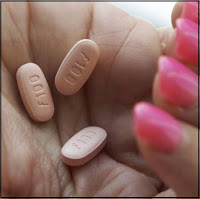If you are half the man you claim to be, you no doubt have NOT skipped over the new Viagra TV ads, which feature a sexy woman telling you not to worry about your erectile dysfunction – it’s more common than you think. Just pop a Viagra pill and you’re ready to go. Meanwhile, she’ll be waiting for you for a happy ending.
Soon, however, these Pfizer full bore sex ads will have competition from Sprout Pharmaceuticals, a small drug company located in Raleigh, NC.
As many media stories proclaim, Sprout Pharmaceuticals is a drug company with a potentially very big drug – “the world’s first pill to boost women’s sex drive.” It’s called Addyi (pronounced “addie”), which, according to Sprout CEO Cindy Whitehead (shown here holding Addyi pills in her hand), is “our representation of Everywoman,” whatever that means!
The FDA will soon announce whether or not it has approved Addyi, which the company plans to market as the “little pink pill.” The agency has rejected the drug twice in the past five years because of questions about its safety and effectiveness.
According to this media story, Whitehead assures that “Addyi is not meant to be prescribed to women looking for a little extra pizazz, or women who are bored with their husbands.” Yeah, right.
Sprout is said to have promised the FDA that it won’t run TV ads for 18 months. What will it do before then to market the drug, if approved. And what will those TV ads look like?
Let me first posit that the TV ads – when they come – will look just like the Viagra ads and appeal mostly to men who will be the driving force to get their wives to try Addyi. That’s because Addyi may be a bigger competitor for Viagra than other ED drugs. Viagra has some serious side effects and is not recommended for men with certain cardiovascular problems (e.g., angina). And, don’t forget, Viagra does not work for all men. All this is an opportunity for medicating the woman vs. the man.
So, despite what Whitehead says, Addyi ads will appeal to men who want their wives to be like the women in the Viagra ads – gung-ho and willing to have sex. Many men might believe this will fix their ED problem.
This is likely to cut into Viagra sales and Pfizer may have seen the writing on the wall. Hence, it started the present Viagra campaign in anticipation. After all, Sprout has been trying to get Addyi approved for a long time, so Pfizer has had time to shell the beaches (and use beaches and bathing suits in its ads). It’s even possible that some of the experts on FDA’s advisory committees, which previously had recommended against approval of Addyi, may have received money from Pfizer (money cuts both ways, you know).
How will Addyi be marketed in the 18 months before the broadcast ads on TV and radio?
Physicians, of course, have to be “educated” about Addyi. Even though Sprout has not yet ramped up its salesforce, I’m sure it has already contracted with Key Opinion Leaders (KOLs) to talk to physicians about women’s libido problems and the clinical studies sponsored by Sprout.
And, there’s the Internet, of course. In this phase of the campaign, Sprout might focus on women who are dominant advertising targets on the Internet and social media sites. There will also be celebrities talking about the “new treatment” on women’s talk shows and via social media. These of course, are not “ads” except when they are as in “OMG. Kim Kardashian Shills for Pharma!”
etc., etc.
One final point: side effects of Addyi include risks of dizziness, sleepiness and fainting, which will appeal to men like Bill Cosby who have sex-related issues other than ED.









![6 Digital Tools at the Center of Healthcare Digitalization [INFOGRAPHIC]](http://ec2-54-175-84-28.compute-1.amazonaws.com/pharma-mkting.com/wp-content/uploads/2021/04/6DigitalTools_600px-100x70.jpg)




